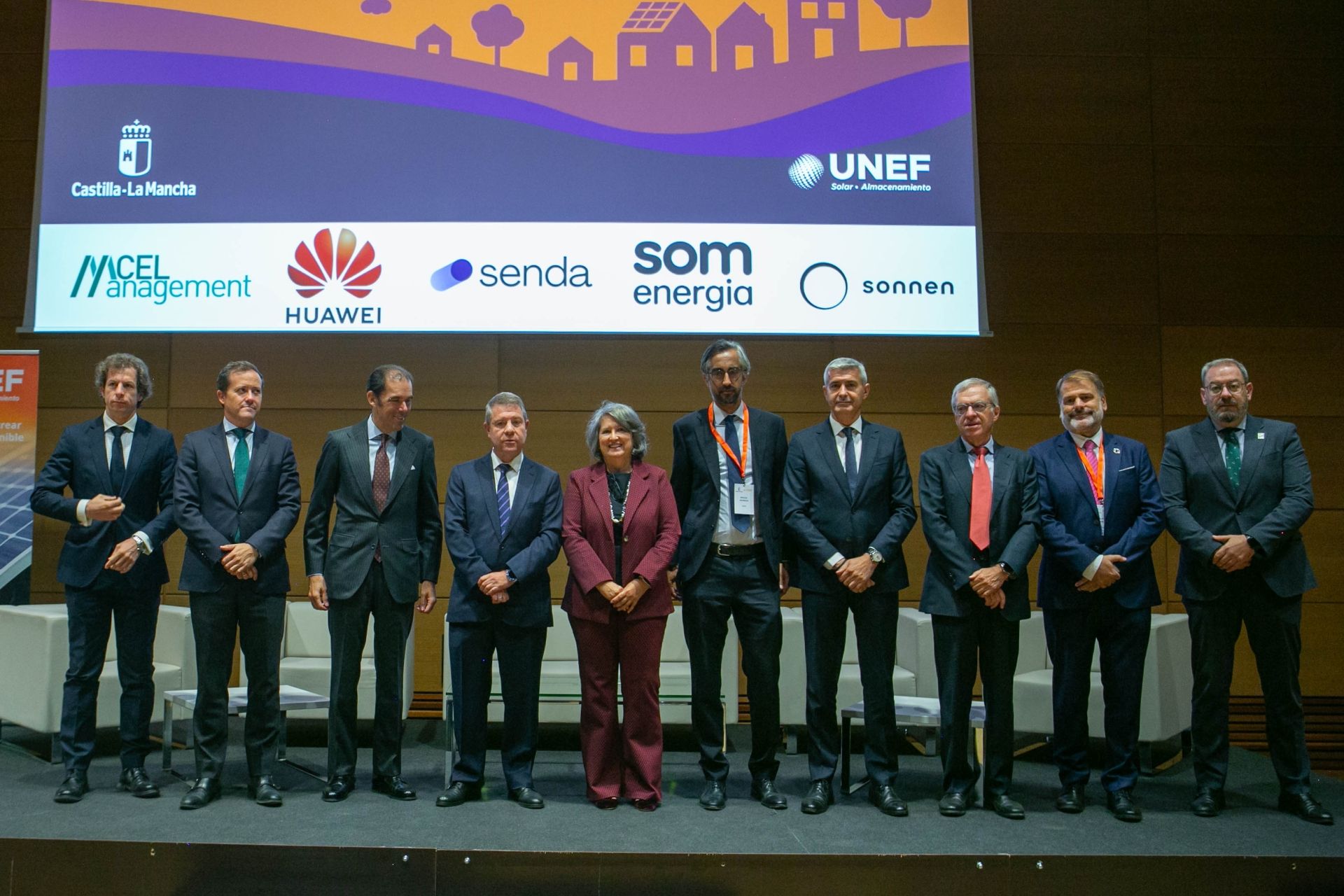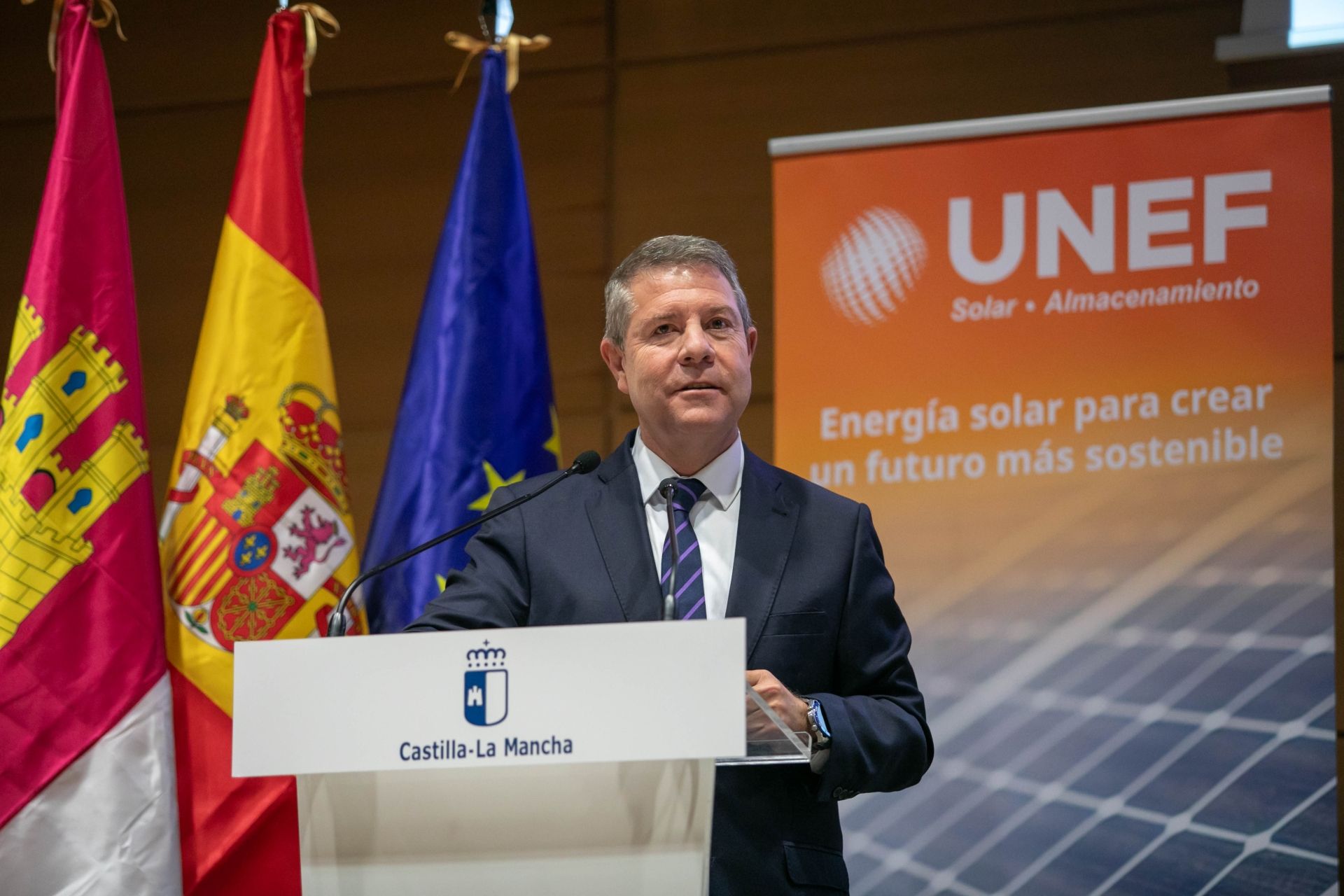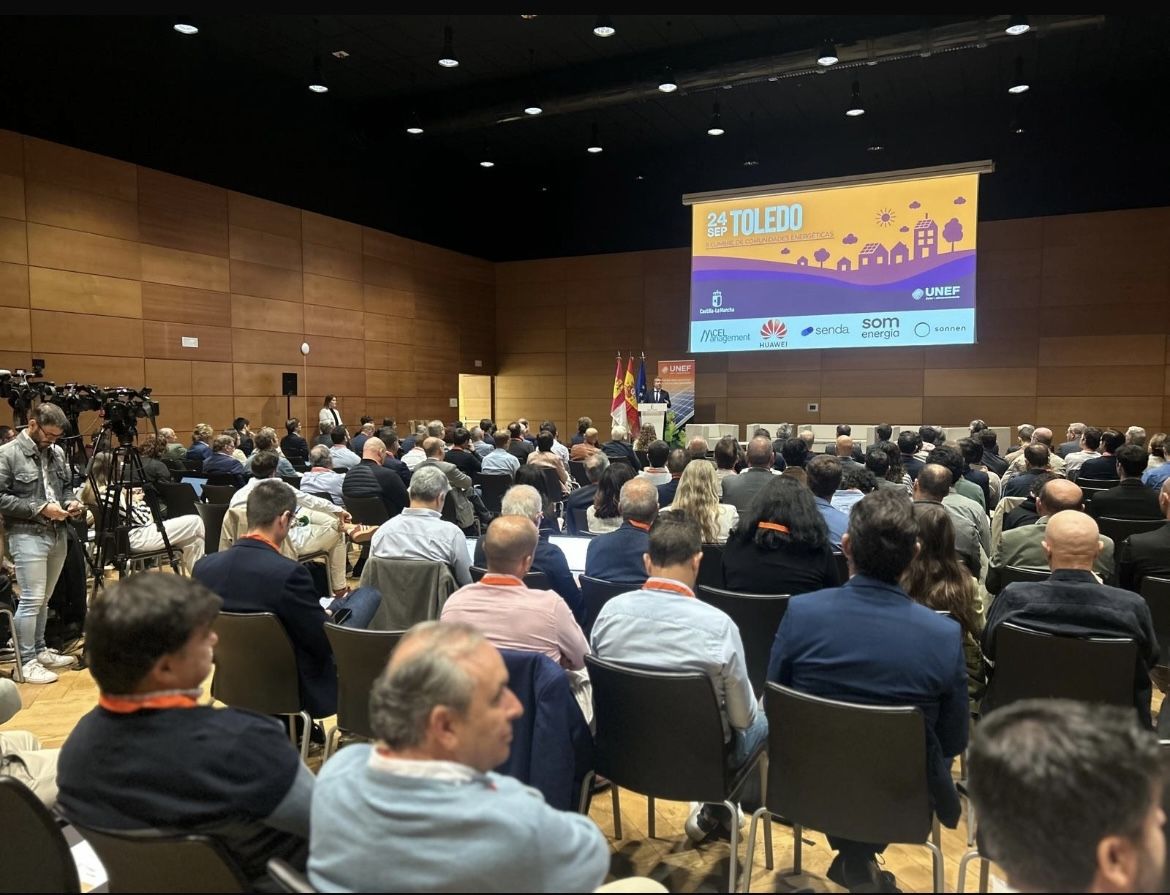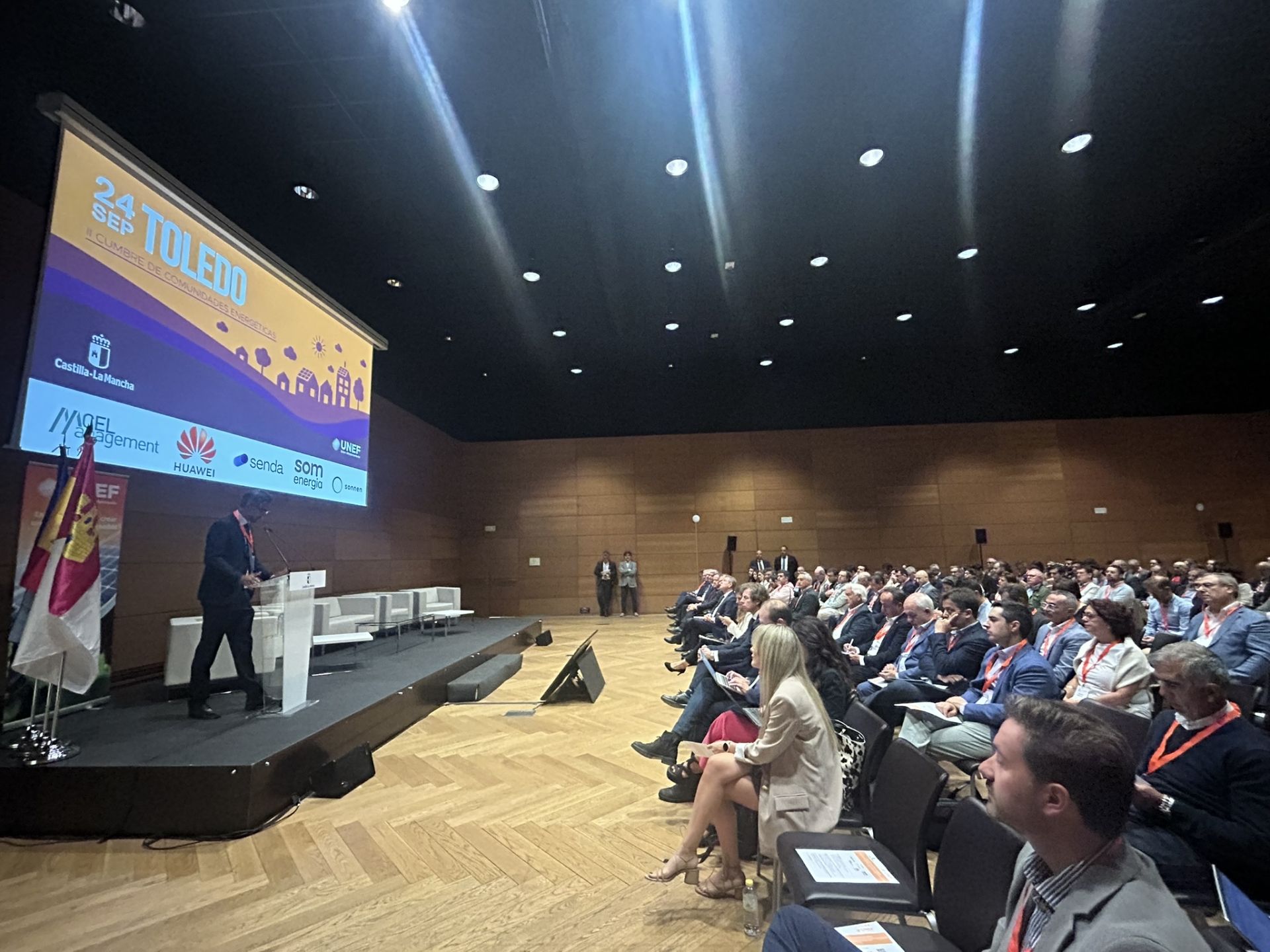- Institutional leaders and sector experts took part in the event, discussing issues such as financing, regulatory frameworks, their role in the electrification and energy transition process, and the involvement of local councils and other public entities.
- The President of Castilla-La Mancha emphasized that Spain could achieve energy sovereignty and announced €10.6 million in funding to be allocated before the end of the year to “stimulate” the development of Energy Communities.
- The event highlighted the value of collaboration between public administrations, the private sector, and citizens as an essential tool for developing this disruptive model.

Toledo, September 24, 2025 – The El Greco Conference Center in Toledo hosted the 2nd Energy Communities Summit, organized by the Spanish Photovoltaic Union (UNEF) in collaboration with the regional government of Castilla-La Mancha. This key event aims to boost a model that directly involves citizens in the electricity system and is considered essential for the success of Spain’s energy transition.
Now in its second edition, the summit brought together over 200 participants, including institutional representatives, experts, local entities, energy communities, service providers, and financial institutions. The goal: to share best practices, identify challenges and opportunities, and discuss solutions to drive the progress of Energy Communities.

Opening ceremony and official remarks
The summit was officially opened by Emiliano García-Page, President of Castilla-La Mancha, along with Mercedes Gómez, Regional Minister for Sustainable Development of Castilla-La Mancha; Carlos Velázquez Romo, Mayor of Toledo; Miguel Rodrigo, Director General of the IDAE (Institute for Energy Diversification and Saving); and Rafael Benjumea, President of UNEF.
In his speech, President García-Page announced that the regional government will launch “before the end of the year, a new call for grants” totaling “€10.6 million, no less,” to continue promoting renewable energy. He stated the funding is intended to “stimulate the electricity sector and energy communities, as well as benefit municipalities and public entities.”
“In terms of energy, we have one of our greatest opportunities as a country,” García-Page continued, adding that “in 2026, we will create a Centralized Unit within the region to provide advisory support and streamline bureaucracy” in the field of energy communities, arguing that “this is the way forward.” This step will further promote community-driven energy models and help “cut through bureaucracy” and simplify administrative processes.
“We are currently in the right moment, and we now have the most important tool to become a future economic power,” the regional president emphasized. “Rather than being dependent on oil, in twenty years this country will have energy sovereignty and will produce its own energy.”

Sector voices and institutional backing
Mercedes Gómez, Regional Minister for Sustainable Development, noted: “We are 20 percentage points above the national average in renewable energy generation. The challenge now is for citizens to have direct access to this energy and to see real savings in their bills. Energy Communities and self-consumption represent a major opportunity.”
Carlos Velázquez Romo, Mayor of Toledo, highlighted that the city is home to the first energy community within a historic city center and announced the creation of a second one, “which will expand the success model of the first community and already has over 100 applicants.”
Miguel Rodrigo, Director General of IDAE, emphasized that “Energy Communities are now well-established as one of the main pillars of the energy transition, especially because they help tackle key challenges facing all stakeholders: energy poverty, electrification of heating and mobility, and revitalization of rural areas. They are a key tool for a fair and inclusive energy transition.”
Rafael Benjumea, President of UNEF, added: “Energy Communities are an opportunity for local territories—towns, cities, and rural areas. They allow us to harness renewable resources to generate community-wide benefits beyond just savings from self-consumption—such as access to shared electric vehicles or building retrofits. These benefits enable non-energy sectors to gain from the electricity system and reinvest in improving the quality of life for community members.”

Energy Communities: a disruptive model on the rise
Energy Communities are made up of members who come together to harness renewable resources or carry out activities related to the energy sector, ensuring that the resulting environmental and socioeconomic benefits are reinvested into the local community.
According to data from ECODES, which presented its “Common Energy Report” at the event, there are currently 679 Energy Communities in Spain.
The host city of this 2nd Summit, Toledo, is home to one of the country’s best examples: the first energy community within a historic district, comprising private individuals, companies, religious institutions, and the city council. This community provides environmental, economic, and social benefits to its members through clean photovoltaic energy and reinvests the proceeds locally.
Clear regulation and public commitment: essential for development
UNEF emphasized the importance of developing a specific regulatory framework that transposes the EU directive into national legislation with concrete applications at the regional level.
UNEF has submitted a proposed framework to Spain’s Ministry for the Ecological Transition (MITECO), stressing the need for:
An enabling regulatory environment for these projects,
Financing mechanisms,
Clear operational definitions,
An official registry of Energy Communities.
“For citizens, companies, and organizations to feel encouraged to create and join Energy Communities, the rules must be clear,” said José Donoso, UNEF’s General Director. “Clear, concrete national regulations are essential, and municipalities must be allowed to take part in these projects—bringing community needs to the table and offering public rooftops and spaces.”
Challenges and opportunities
Throughout the summit, which runs until this evening, participants are addressing the main challenges and opportunities for Energy Communities across different sectors, their role in boosting electrification, public-private collaboration with local entities, and how different community types—industrial, urban, or rural—face unique opportunities and barriers.
The event will also showcase both technical and social innovations, as well as various funding pathways.
The summit will conclude with closing remarks by Alipio García, Director General for Energy Transition of Castilla-La Mancha, and José Donoso, General Director of UNEF.
About UNEF
The Spanish Photovoltaic Union (UNEF) is the industry association for solar photovoltaic energy in Spain. It is made up of more than 800 companies, organizations, and groups across the entire value chain of photovoltaic technology and represents over 90% of the sector’s activity in Spain. Its members include producers, installers, engineering firms, manufacturers of raw materials, modules and components, distributors, and consultants.
UNEF also holds the presidency and secretariat of FOTOPLAT, the Spanish Photovoltaic Technology Platform, which brings together leading universities, research centers, and companies in photovoltaic R&D in Spain.
